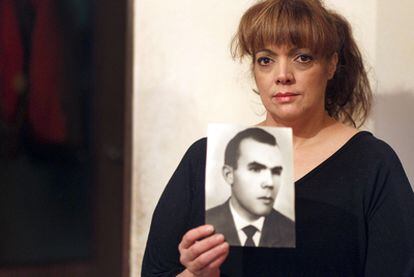Franco family to be sued over failed heart transplant four decades ago
Daughter of patient claims operation was carried out for political reasons
On September 18, 1968, less than a year after Christian Barnard had performed the world's first human-to-human heart transplant in South Africa, Spanish surgeon Cristóbal Martínez Bordiú, the son-in-law of General Francisco Franco, sought to repeat the feat.
South Africa's apartheid regime had been given a rare boost thanks to the positive coverage of the operation in the international media, and Spain's discredited military government, which at the time was into its third decade in power, could certainly have done with a shot in the arm.
In both operations, the patients died soon after: Barnard's lived for 18 days; Martínez Bordiú's, a plumber named Juan Rodríguez Grillé, survived for exactly 27 hours.
Now, more than four decades later, Rodríguez Grillé's daughter has begun legal action against the Martínez Bordiú-Franco family for failing to keep a promise she says that the surgeon - who died in 1998 - made to provide for her and her mother in the event of her father's death.
"My father knew that he was going to die, and he gave his life for me," says María Jesús Rodríguez Boga. She says that her mother, who is still alive, and the rest of her family, was against the heart transplant, as was the family of the donor.
Rodríguez Boga says that Martínez Bordiú and senior staff at the La Paz Madrid hospital where her father had been admitted for chronic gall bladder and liver problems, put the family under intense pressure, making it clear that the prestige of the Franco regime was at stake. "You have performed a great service for Spain, greater than you know," the head of the hospital reportedly told the family after Rodríguez Grillé died.
At a meeting with Martínez Bordiú, Rodríguez Boga says that her mother was told that if the operation failed, the hospital would take care of the funeral arrangements. She says that the surgeon personally assured her mother that the family would be taken care of.
"He assured my mother, literally, that my 'future' and my 'studies' would be taken care of," she says. And at the news conference Martínez Bordiú gave after the death of Rodríguez Grillé, he said that the Labor Ministry would keep its promise to look after the family.
By 1970, more than a year after Rodríguez Grillé's death, the Labor Ministry had still not contacted the widow, who, says her daughter, was penniless, and virtually unable to pay her electricity bills.
In 1971, says Rodríguez Boga, her mother wrote to the Labor Ministry reminding it of the promise that had been made to the family and asking for a place to be found for her daughter at a state school. "They didn't even bother replying."
Rodríguez Boga has now begun legal proceedings against the descendants of Martínez Bordiú, who belong to the family of the Marquis of Villaverde, many of whom regularly grace the pages of upmarket gossip weekly ¡Hola!, notably Carmen Martínez Bordiú, Franco's granddaughter, who has made a career over the years writing for ¡Hola!, as well as appearing on Spain's equivalent of British celebrity dance program Strictly Come Dancing (Mira quién baila in Spanish). She is also a regular on daytime gossip show Sálvame.
"It makes my blood boil when I see the lifestyle that the daughter of that quack has set up for herself," she says.
Rodríguez Boga says that she has documentary proof of Martínez Bordiú's promise. "My lawyer has told me that there is no statute of limitations in a case like this," she adds.
"There is a photograph of my father just before the operation, and he looks healthier than I do now," says Rodríguez Boga, adding that the medical reports about his condition were grossly exaggerated so as to justify the operation, and subsequently the failure of the transplant, which led to her father's death.
Rodríguez Grillé suffered from a hereditary problem with his gall bladder, which was removed when he was 28. He was later operated on for an ulcer when he was 34. He had moved to Madrid after that, working as a plumber. When his mother was killed in a road accident, he began suffering from depression. He was admitted to the La Paz hospital at the end of 1967, aged 41. He was diagnosed with liver problems that were causing tachycardia, or abnormally rapid heartbeat.
Martínez Bordiú was an avid admirer of Christian Barnard, and persuaded the surgeon's brother, Marius, also a surgeon, and who had participated in the pioneer heart transplant, to come to Madrid while the operation was performed. Barnard was with Martínez Bordiú at the news conference the morning after the operation.
"The patient is recovering rapidly, he is stable, and getting better," Martínez Bordiú told reporters, letting slip afterwards: "The 16 or 17 hours that he has spent with the new heart is a triumph for any doctor."
Seven years later, Martínez Bordiú would head the medical team, along with Marius Barnard, that would keep his father-in-law Franco alive for months until he finally died in November 1975.
"My vocation is not political," Martínez-Bordiú often said. "I am a surgeon." But others described him as a Franco loyalist who tried to jockey for power during the general's final years and who sought to delay the transition to democracy after Franco's death.
In the mid-1980s, a hospital in Madrid suspended Martínez-Bordiú after questioning his competence as a doctor, and a medical school dismissed him as director. However, Franco's son-in-law argued that with a Socialist government in power at the time, the questioning of his professional abilities was politically motivated.











































